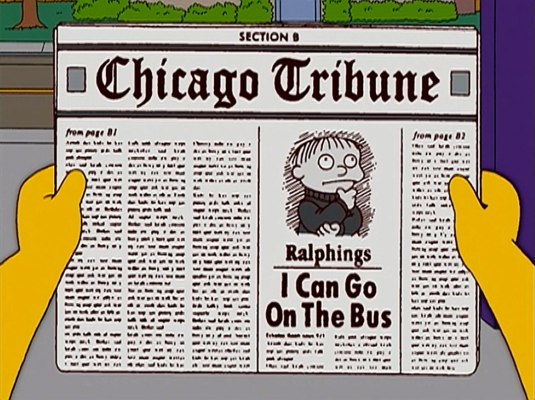It’s junior year in the elongated, two-hundred-year long college education of American media and things are getting weird. The nerds are still playing pinochle and hanging out in the library but they’re getting antsy. The cool kids are trying new things while the liberal arts majors are getting MBAs. The prankster lacrosse players are being sent to the dean. And then there are the frat boys, the guys who partied while cozying up to the smart kids for free tutoring. Those guys are they’re realizing that they want to be EDM DJs and/or that they’re about to flunk out so they’ve embarked on a wholesale voyage of change. They’re dressing all cyberpunk, they’re smoking a little pot, they’re taking mushrooms, and they’re watching Family Guy.
And they’re all trying anything – anything – to stay relevant.
The Tribune’s decision to rebrand as Tronc is completely silly and will probably be reversed in the next few weeks. However, how funny is it that a centuries old media company thinks it can turn itself into a cutting edge new media company with its desiccated finger on the pulse of America’s youth? How silly is it that a media company that once spanned the globe with amazing coverage is now dedicating itself to “content?” And how sad is it that, in the end, none of it matters.
First, a little bit on this whole Tronc thing and why journalists and hangers-on think it’s so silly. The Tribune Company was a major media powerhouse. Founded in 1847, the company spun off its ten newspapers into Tribune Publishing and has over forty television channels under Tribune Media. The newspaper business is moribund and getting moribunder. The television industry is solid but still in trouble and new media, including adtech, is about to hit a financial wall as investment dries up and litigious rich people decide they can use the Thiel precedent to throw molotov cocktails from the safe confines of their Burning Man tent. So what does the Tribune Company do? They decide to change their name to Tronc and reborn as “a content curation and monetization engine” which, in short, means they want more Pizza Rats and fewer Pulitzers.
Understand that it doesn’t matter what Tribune calls itself. The Tribune name is irrelevant to the vast majority of consumers and newspapers that once proudly published under that banner are shadows of their former glory. The world in which the Chicago Tribune and LA Times held sway is gone, replaced by endless Facebook feeds, blogs, and Twitter. The company could call itself Viral Videos ‘R’ Us and it wouldn’t change the fact that its best days are far behind it.
Why did the company pick Tronc? Presumably because it would shake things up. Tribune Media sounds like a place your uncle the accountant would work. Tronc? That sounds young, hip, and connected. The company figures they can get young media types to eschew PR and marketing and hop on the Tronc train to cash town. They figure they can still pay small wages for good work and that a new generation will see Tronc as a place to make a career and not a stepping stone to a job at Disney. But a name change won’t change the fact that places like the Tribune underpay, under-deliver, and underwhelm year after year.
Being cheap in media is expensive. For decades big media companies could pay their peons a little bit of money for even less exposure. Journalism grads fought to get unpaid internships at smart, small magazines and the only money was in the publisher’s pocket. But there was a certain pride to be had in working for a media company that dedicated itself to the hunt for truth.
Now that dedication to truth is found elsewhere. It’s found in blogs, it’s found on YouTube, and it’s found in self-publishing. While it’s nearly impossible to, say, create a Spotlight team without the largesse of a benefactor, that hasn’t stopped a number of sites from trying.
In the end the giggling at Tronc is journalism whistling past the graveyard. If Tribune Publishing, a company that runs two of the biggest newspapers in America, thinks it has to rebrand into something hip and cool what are the investigative reporters, the profile writers, the features artists going to do? They don’t have big Twitter followings and their Facebook is dedicated to family photos. They can’t make virality nor can they fake it. They are sunk.
Tronc, then, is the final proof that media has moved on. The old ways are, well, old and the new ways are inscrutable. The papers of record are no longer papers and content is valued more than writing and headlines are being replaced by hashtags. Some media companies will graduate to the next level but many, including Tronc, probably won’t.
The worst thing is that journalism suffers. Go ahead and snort that this site is proof of that but you’re here, aren’t you? Refreshing the page hourly, checking out who is buying whom and which robot Elon Musk expects will kill you.
Journalists don’t make their bones in media by writing obituaries for the Kansas City Star anymore. They get their first media jobs by being funny on Twitter or running a blog about lipstick. An industry that once rewarded dedication and loyalty with pensions and steady work is now looking at a generation that wants to write City Hall stories like it wants a hole in the head. In the end we are all the poorer for it, but don’t blame the readers: they smell laziness and disingenuousness. They stopped putting down a nickel (or $1.99) for the daily paper long ago and, instead, they’ll readily watch a video ad for Doritos to read more about the Kardashians. It’s a sad but understandable trade-off.
What’s the sound of media dying? Tronc.
